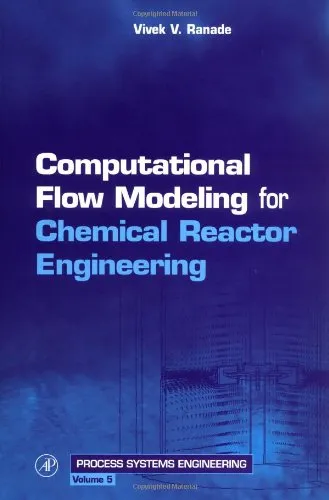Computational Flow Modeling for Chemical Reactor Engineering
4.5
Reviews from our users

You Can Ask your questions from this book's AI after Login
Each download or ask from book AI costs 2 points. To earn more free points, please visit the Points Guide Page and complete some valuable actions.Introduction to 'Computational Flow Modeling for Chemical Reactor Engineering'
Welcome to the world of computational fluid dynamics (CFD) tailored for the intricate requirements of chemical reactor engineering. 'Computational Flow Modeling for Chemical Reactor Engineering' is a pioneering book authored by Vivek V. Ranade. This text bridges the gap between chemical engineering principles and computational modeling techniques, offering readers an insightful perspective into how fluid dynamics, chemical reactions, and multiphase flows can be efficiently modeled using modern computational tools.
The book is designed for a diverse readership, including researchers, academics, and practitioners in the fields of chemical engineering, applied physics, and computational sciences. It focuses on integrating fundamental concepts of reaction engineering with advanced computational methodologies, enabling readers to solve real-world chemical reactor problems effectively. Whether you are an experienced CFD practitioner or a newcomer, this book presents practical insights that will enrich your understanding of flow phenomena within chemical reactors.
With the rapid advancement of technology, computational tools have become indispensable in reactor design and optimization. This book not only provides a strong theoretical foundation but also discusses practical implementations and limitations. From predicting flow patterns in industrial reactors to modeling gas-liquid interphase interactions, the text equips readers with analytical techniques that profoundly enhance reactor performance while reducing inefficiencies and costs.
Detailed Summary
The book is systematically organized to allow readers to progress from foundational concepts to advanced applications seamlessly. It explores topics such as:
- Basic equations governing flow, heat, and mass transfer.
- Modeling of single-phase and multiphase flows within chemical reactors.
- Detailed analysis of turbulent flows and their impact on chemical reactions.
- Techniques for coupling flow modeling with reaction kinetics.
- Integration of experimental data with computational simulations for validation purposes.
The inclusion of case studies and practical examples ensures that complex theories are elucidated through real-world scenarios. The book provides a step-by-step guide to setting up CFD models, understanding boundary conditions, and interpreting results, making it a practical toolkit for engineers and researchers alike.
Key Takeaways
- Comprehensive understanding of how computational modeling transforms chemical reactor design.
- Practical applications of CFD in solving industrial chemical engineering challenges.
- Knowledge of effective modeling techniques for turbulent, multiphase, and reactive flows.
- Insights into the limitations and challenges of computational flow modeling.
- Enhanced skills to interpret simulation data and improve reactor performance.
Famous Quotes from the Book
"A model is only as good as its ability to predict the reality of the system it represents."
"Understanding turbulence is not just about deciphering chaotic patterns, but about realizing its potential to enhance chemical reaction rates."
"Computational flow modeling doesn’t replace experimentation; it complements it by offering dimensions that experiments cannot easily capture."
Why This Book Matters
The need for precision and optimization in the chemical industry is more critical than ever. Efficiently designing and scaling chemical reactors requires a detailed understanding of flow dynamics and chemical kinetics. 'Computational Flow Modeling for Chemical Reactor Engineering' fills a much-needed gap by presenting a clear and practical framework for incorporating CFD into reactor engineering workflows.
The book’s relevance spans industries such as pharmaceuticals, petrochemicals, environmental engineering, and energy production, where enhancing reactor efficiency can directly translate into economic and environmental benefits. By empowering professionals with the skills to analyze and predict reactor behavior under various scenarios, this book is a cornerstone for advancing the application of computational modeling in chemical processes.
The text is rooted in decades of academic and industrial expertise, ensuring both theoretical rigor and practical relevance. It inspires readers to embrace modeling as an essential partner to experimentation, fostering innovation in reactor design and operational excellence.
Free Direct Download
You Can Download this book after Login
Accessing books through legal platforms and public libraries not only supports the rights of authors and publishers but also contributes to the sustainability of reading culture. Before downloading, please take a moment to consider these options.
Find this book on other platforms:
WorldCat helps you find books in libraries worldwide.
See ratings, reviews, and discussions on Goodreads.
Find and buy rare or used books on AbeBooks.
1131
بازدید4.5
امتیاز50
نظر98%
رضایتReviews:
4.5
Based on 0 users review
"کیفیت چاپ عالی بود، خیلی راضیام"


